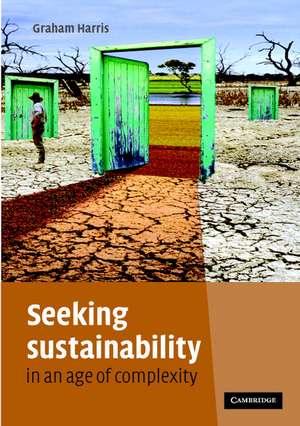Seeking Sustainability in an Age of Complexity
Autor Graham Harrisen Limba Engleză Paperback – 13 iun 2007
Seeking Sustainability in an Age of Complexity explains the difficulties of sustainability and why 'collapse' can occur. In the last twenty years the theory of complexity has been developed - complex systems science (CSS) speaks to natural systems and particularly to ecological, social and economic systems and their interaction. Due to the growing concern over the huge changes occurring in the global environment, such as climate change, deforestation, habitat fragmentation and loss of biodiversity, Graham Harris sets out what has been learned in an attempt to understand the implications of these changes and suggests ways to move forward. This book discusses a number of emerging tools for the management of 'unruly' complexity which facilitate stronger regional dialogues about knowledge and values, which will be of interest to ecologists, sociologists, economists, natural resource managers and scientists in State and local governments and those involved in water and landscape management.
Preț: 451.70 lei
Preț vechi: 507.53 lei
-11% Nou
86.43€ • 90.48$ • 71.52£
Carte tipărită la comandă
Livrare economică 05-19 aprilie
Specificații
ISBN-10: 0521695325
Pagini: 376
Ilustrații: 1 table
Dimensiuni: 170 x 244 x 20 mm
Greutate: 0.75 kg
Editura: Cambridge University Press
Colecția Cambridge University Press
Locul publicării:Cambridge, United Kingdom
Cuprins
Preface; Dedication; Acknowledgements; 1. Preamble: the world we are in; 2. Complex systems; 3. New science, new tools, new challenges; 4. The complexity of ecology; 5. The generation of complexity; 6. Micro interactions and macro constraints; 7. A changing sense of place; 8. Complexity in created landscapes; 9. Catchment form and function; 10. Catchment loads - ecosystem impacts; 11. Change detection, monitoring and prediction; 12. Evidence, uncertainty and risk; 13. Modified landscapes: biodiversity; 14. Function in modified landscapes; 15. Environmental flows; 16. Evidence for global change; 17. Values and beliefs; 18. Managing environmental, social and economic systems; 19. Linking multiple capitals; 20. Community, capacity, leadership and collaboration; 21. A new environmental paradigm; 22. Emergent problems and emerging solutions; 23. Avoiding collapse.
Recenzii
'… a valuable resource for anyone interested in the relevance of complexity theory to applied ecology and the management of natural systems. … Anyone who believes that landscape ecology offers tools and insights essential to effective management of natural resources and seriously wants to see landscape ecology integrated into management practices will find it an important and rewarding resource.' Landscape Ecology












